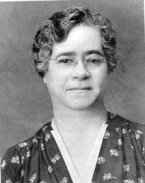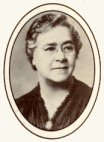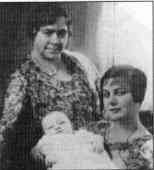
TL;DRA:
Susan Norris Fitkin founded what is Nazarene Missions International, an organization that mobilizes local congregations for the support of world missions efforts. Though poor health kept her from serving overseas, she devoted her life to mobilizing prayer, giving, and global missionary passion throughout the denomination. Her leadership, writings, and tireless advocacy made her an extremely influential Great Commission fulfillment mobilizer.

Image Source
"Susan Fitkin has encouraged me to be a supporter of world missions just as she was." -- Philip B., Nazarene Bible College student
Some missionary heroes of the past are remembered for more than their cross-cultural ministry. They have also been good mobilizers of the church back home.
Sadly, I have heard missionaries grumble about having to speak in lots of deputation services. In my opinion, they were thinking far too narrowly about their missions call. World evangelism mobilization should be seen as part and parcel of a missionary call. Indeed, in the long run, mobilizing the church at home contributes greatly to Great Commission fulfillment.
Indeed, people call William Carey (1761-1834) "the father of the modern missionary movement" in part because he was a terrific mobilizer as well as a pioneer missionary to India.
In its early decades, the Church of the Nazarene was blessed with an powerful global missions mobilizer in Susan Norris Fitkin. Growing up in Canada, Susan felt that God wanted her to be a foreign missionary. However, serious health issues prevented that.
Rather than turning her attention elsewhere, Susan spent the rest of her life fulfilling that call by mobilizing others. She infused global passion into her church and mobilized intercessory prayer and resources for world evangelism.
In 1908, Susan's small denomination merged with two others to form the Church of the Nazarene. She was disappointed when the new denomination failed to set up a missions mobilization organization such as today's Nazarene Missions International (NMI). However, Susan worked behind the scenes for seven years until it happened (and she, by the way, was elected first president of that organization).
Over the 30 years in which Susan Fitkin led what is now NMI, she traveled to mission fields around the globe. While she reported to the North American church about those visits, her most powerful appeals for world evangelism involvement were grounded in Scripture.
Susan was convinced that ALL of Scripture communicates God's desire for world evangelism. In her little booklet Holiness and Missions, she quoted 29 of the Bible's 66 books. Susan Fitkin could preach on world evangelism from Isaiah and Jeremiah just as powerfully as she could from the Great Commission in Matthew 28 (read booklet).
As a volunteer global missions mobilizer for more than four decades, Susan Fitkin may well be the person most responsible for the world missions component of today's Nazarene ethos.
Susan got the denomination to publish a monthly world missions magazine. Using a phrase from John 10:16, "I have other sheep that are not of this sheep pen," she titled that magazine The Other Sheep. She was also a key player in launching what is now the Nazarene World Evangelism Fund. Through the Great Depression, Susan Fitkin kept Nazarenes motivated to give to and pray for world evangelism.
Susan Norris Fitkin stands as an example of how people called to be missionaries can be used by the Holy Spirit to fuel a passion for world evangelism among believers.
"I had feelings like Moses did at the burning bush when he made excuses for why he could not go. I remember coming up with a list of excuses for why I couldn't get involved in world evangelism. What I finally realized is that we have a huge responsibility as leaders to help prepare and equip our congregations for world evangelism. Our job as leaders is to become a mobilizer." -- Zachary S., Northwest Nazarene University student
-- Howard Culbertson, hculbert@snu.edu
by Stan Ingersol, Nazarene denominational archivist
Authorized by the General Assembly of 1915 as the missionary auxiliary of the Pentecostal Church of the Nazarene, what is today the Nazarene Missions International was first known as the Women's Foreign Missionary Society. The organization quickly joined the deaconess movement as one of the two main avenues for women to serve in the church's ministry to the world.
Much of the inspiration and leadership of the early NMI sprang from Susan Norris Fitkin. Her ability to articulate a missionary vision and to inspire others was rooted in her personal experience as an evangelist and pastor.

Susan Norris was a Canadian, born March 31, 1870, on a farm near Ely, Quebec. Her Quaker parents were active in the temperance reform movement. Her mother served once as a delegate to the Women's Christian Temperance Union convention in Ottawa.
In 1881, the family moved to East Farnham, Quebec, where Susan's parents held longstanding membership in a Quaker meeting house. She, too, attended Quaker worship but also visited an Anglican church. Later, she began attending the Union Chapel, an interdenominational church that was strongly evangelical in emphasis. Each different strain of piety nourished her spiritual development. Several encounters with life-threatening illnesses, including typhoid fever, heightened her seriousness toward religion. At times, she experienced unusual dreams and saw visions.
In 1890, she offered herself as a missionary to China Inland Mission, the organization founded by Hudson Taylor, but was refused for health reasons. She began conducting services for youth in her community and then, at her mother's urging, in other communities. Out of this, her ministry as an evangelist began emerging around 1892. Attending a Christian Endeavor meeting in New York City, she met J. Walter Malone, a leader in the fast-growing holiness wing of the Society of Friends (or Quakers as they are more commonly known).
Norris studied at attended Malone's school, Friends' Bible Institute and Training School in Cleveland. While there, she began preaching in revivals. In 1893, she became pastor of a church in Vermont where she had previously held a revival. Another pastorate followed in the Green Mountains. By that point, she was listed as a "recorded" (or official) minister in the Friends Church. In 1895, at the urging of a leading New York Quaker, Susan Fitkin returned to evangelism. That fall, she was sanctified in a revival and paired for six months with Abram E. Fitkin. Was someone playing matchmaker? The sources do not say, but Susan Norris and A. E. Fitkin were married by a Quaker minister on May 14, 1896.
By that date, the two evangelists filed regular reports of their work in The Christian Witness, a leading holiness journal and organ of the National Holiness Association. In late 1896, they organized an independent group of 60 members in Hopewell Junction, NY, at the conclusion of a revival. Since the new congregation was mostly non-Quaker in church background, the Fitkins steered it toward affiliation with the Association of Pentecostal Churches of America, the Nazarene parent body in the East, which they, too, joined.
Until A. E. Fitkin embarked on a new career on Wall Street in 1903, both he and Susan served the APCA as evangelists. In 1899 and 1900, Susan Fitkin helped write a constitution for the APCA's women's missionary auxiliary. She was then elected its president. Between 1900 and 1907, that group grew from about 75 members to nearly 400.
The church unions of 1907 and 1908 demoted the Eastern group's missionary auxiliaries to the status of mere local societies. Many women -- Susan Fitkin chief among them -- began raising denominational consciousness for the need for an organized missions auxiliary. It took seven years, but their vision was finally realized in 1915. Rev. Susan Fitkin became the organization's first president. She served in that office until 1948, using her skills and gifts as a preacher and evangelist in the advocacy of world missions. Susan Norris Fitkin died in California in 1951.
Note: David Sol, Nazarene pioneer district superintendent in southern Mexico, mentioned support given to him by Susan Fitkin while he was a ministerial student -- see page 23 of Honorato Reza's Washed by the Blood, published by Beacon Hill Press of Kansas City in 1953
"I awoke trembling and greatly moved, and was wondering what it all meant when I became conscious of the divine presence. It was like a person standing beside my bed, and in an audible voice saying solemnly: 'Go ye into all the world, and preach the Gospel to every creature!'
"I was astonished, for I was still an invalid, but I at once replied, 'Oh, Lord, I will go, but you know how frail I am. You will have to take all the responsibility.' He assured me that He would, and a great peace filled my soul. This was such a clear call that I never doubted it.'"

Susan Norris Fitkin, pioneer Nazarene world missions leader and
founding NMI president
After 10 years of preaching, starting and pastoring churches, first for the Society of Friends (Quaker) and then for the Association of Pentecostal Churches, Susan Fitkin was ordained an elder in the [newly-formed] Pentecostal Church of the Nazarene with Dr. Phineas F. Bresee officiating. She later wrote, "This was a memorable occasion but it was only the human sanction to God's work. Years before, He had definitely spoken His precious words to my heart: 'Ye have not chosen me, but I have chosen you, and ordained you, that you should go and bring forth fruit,' and has He not verified it again and again?" (S. N. Fitkin, Grace Much More Abounding, Nazarene Publishing House, n.d., pages 10-11, 46.)
As founder and president of the Women's Foreign Missionary Society (now Nazarene Missions International) from 1915-45, Susan Fitkin played a major role in fanning Nazarene passion for world missions involvement. She frequently visited mission fields at her own expense. Then, she would write about her experiences and tour in the States, telling the churches about the needs overseas. In 1956, the memoirs committee of the General Assembly wrote that it would be impossible to fully know "the results of her prayers, her compassion for the lost, and her untiring efforts to send the Gospel to the ends of the earth."
-- Steve Cooley, former director of Nazarene Archives. Published in what is now Holiness Today. Used by permission.
"God wants to be in relationship with us first and foremost. The following and finding of God's plan flows from that rather than the other way around." -- Jim B., Northwest Nazarene University student
by Melodie Sides, submitted to fulfill a course requirement in an SNU missions class
"We never test the resources of God until we attempt the impossible for Him."
-- Susan Fitkin, quoting F.B. Meyer

Susan Fitkin, her daughter-in-law and grandson
Susan Norris, born in Quebec in 1870, always wanted to be a missionary. Once when she was a small girl riding around the lumber camp with her father, she witnessed a disturbance among some of the Indian workers. When she returned home, she asked her mother why the men were "so mean."
Not satisfied with her mother's explanation that liquor made people behave like that, Susan asked, "If it makes them mean, why do they drink it?"
"I guess they don't know Jesus," her mother replied.
"Someone should tell them about Him!" came the response from young Susan (York 17-18)
So, Susan Fitkin grew up with a burden for lost people. In her early years, she took that burden to mean that she would someday go overseas as a missionary. Then, at the age of fourteen, she became very ill. Diagnosing her with cancer, the doctors predicted that Susan Fitkin would not live very long. During the next two years, she was almost constantly in bed, but it was during that time that she truly came to a saving knowledge of Jesus. Sometime after she was saved, she had a dream of Christ's Second Coming. She was intensely happy until she saw that all the people would not be going to heaven. When she woke up, she wondered why she had such a sad dream. Then a voice seemed to quote Mark 16:15 to her: "Go ye into all the world, and preach the gospel to every creature."
Because Susan thought this was God calling her to be a missionary preacher, she was excited! Then, when she eventually applied to be a missionary, she was turned down because of her health condition. That was puzzling to her. One day while reading her Bible, Susan came across Ezekiel 3:5. A sentence jumped out at her: "You are not being sent to a people of obscure speech and strange language." Though Susan Fitkin accepted this to mean that she was not going to go to a foreign land as a missionary. She didn't know what to do. She had been planning on being a missionary for such a long time!
She ended up going to a Bible Training school for future missionaries. While there, she was physically healed from her cancer. After graduation, she took a position as a local church pastor in Vermont. While serving in that position, she was sanctified during a regular preachers' meeting. She also met her future husband, Abram Fitkin, while pastoring that church. After their marriage in 1896, they became traveling evangelists together. Then, they moved to a small town in New York and started a church in an old blacksmith shop. Wherever she spoke, she pushed people to take good care of their missionaries serving on foreign fields.
After Susan and her husband again became traveling evangelists, the churches in their denomination, the Association of Pentecostal Churches of America, allowed her to form a denominational missionary society. Then, in 1908 when her own denomination joined with two other small ones -- the Holiness Church of Christ in the south-central U.S. and the Church of the Nazarene in the West -- to form a single denomination, they failed to establish a foreign missionary auxiliary to serve the united group. The beginnings of such a group had to wait seven years until 1915. When the missions promotional organization that is now called Nazarene Missions International) was finally formed, Rev. Susan Norris Fitkin was elected its first General President. She held that position for the next 29 years, stepping down only when she retired in 1948 (Parker, 73).
During her long tenure as General Mission President, Susan Fitkin "traveled the foreign fields more extensively than any church . . . leader among the Nazarenes" (Perkins, 75). One reason she was able to do that was because she usually paid her own travel expenses from her husband's successful business ventures.
S.N. Fitkin (the name she often went by in print) was a woman of prayer and a great organizer. Fusing those two gifts together, she helped Nazarene global outreach to survive the Great Depression. Susan Fitkin fed Nazarenes information from her own travels and from correspondence she received from missionaries. She kept the worldl missions mobilization work organized, inspiring American families to give to missions even amid their economic struggles. She spurred on believers with sayings like: "Depend on God to see us through" (Perkins, 76) and "We never test the resources of God until we attempt the impossible for Him" (Perkins, 77).
Susan Fitkin never realized her early dream of going to a foreign country as a career missionary. However, in Fred Parker's 1985 comprehensive history of Nazarene missions, this remarkable lady is credited as a major player in sending out 1,763 other people as missionaries (the total number of career missionaries that had served under the Church of the Nazarene through 1985) (Parker, 642). Indeed, Susan Fitkin was the key person in starting and establishing the missionary mobilization and promotion arm of the Church of the Nazarene. Her enthusiasm and love for the lost around the world had been clearly translated into missionaries and other resources to reach these people.
Parker, J. Fred. Mission to the World. Kansas City: Nazarene Publishing House, 1988.
Perkins, Phyllis. Women in Nazarene Missions: Embracing the Legacy. Kansas City: Nazarene Publishing House, 1994.
York, Mark A. The Girl Who Wanted to Be a Missionary: The Susan N. Fitkin Story. Kansas City: Nazarene Publishing House, 1985.
Cooley, Steven D. "The Call of Susan Fitkin." Herald of Holiness 74, no. 20 (15 October 1985): 9.
Ingersol, Stan. "Mother of Missions: The Evangelistic Vision of Susan Norris Fitkin." Herald of Holiness 80, no. 1 (January 1991): 44.
Holiness and missions, a booklet written by Susan Fitkin in 1940. "Holiness and missions, like Siamese twins, are inseparable . . ."
In book form
Fitkin, Susan Norris A Brief History of the Woman's Missionary Society, Church of the Nazarene, 1915-1927. Kansas City, MO: Woman's Missionary Society, 1928.
Fitkin, Susan Norris. Grace Much More Abounding: A story of the triumphs of redeeming grace during two score years in the master's service. Kansas City, Mo.: Nazarene Publishing House, 1930.
Fitkin, Susan Norris. Over in Old Mexico. Kansas City, Mo.: Nazarene Publishing House, 1929.
Fitkin, Susan Norris. Under Tropical Skies Kansas City, Mo.: Nazarene Publishing House, 1929.
Fitkin, Susan and Emma B. Word. Nazarene Missions in the Orient. Kansas City, Mo.: Nazarene Publishing House, 1937.
Miller, Basil. Susan N. Fitkin: For God and Missions. Kansas City, Mo.: Nazarene Publishing House, 1949.
Susan Norris Fitkin, a prominent figure in the early decades of the Church of the Nazarene, made valuable contributions in four key areas:
There are denominations that say certain leadership roles in the church can only be filled by men. Susan Fitkin would not agree. Here are some resources that provide a biblical foundation for her position.
Videos
Articles